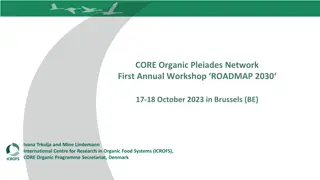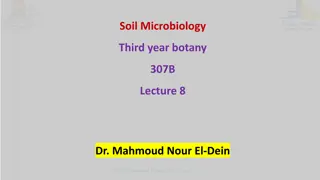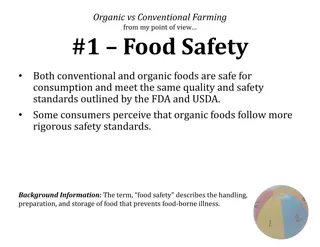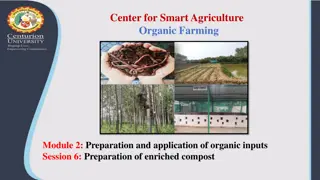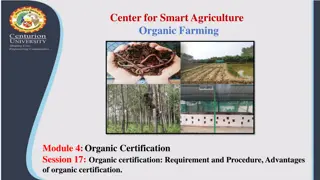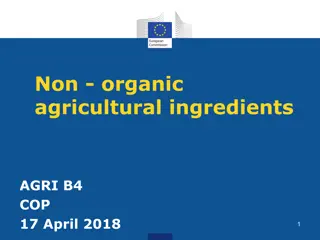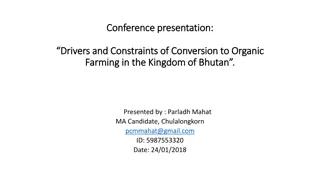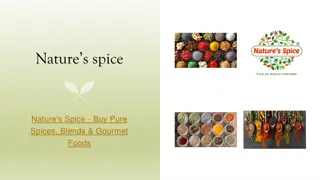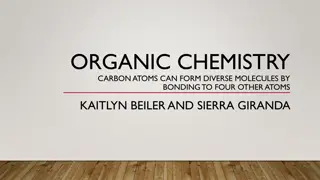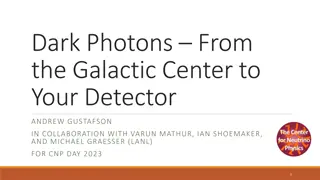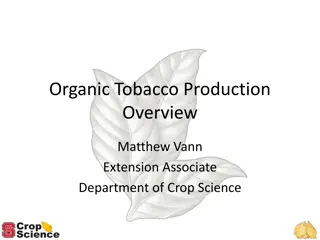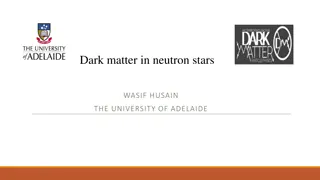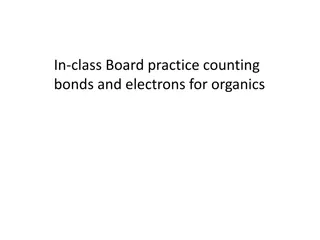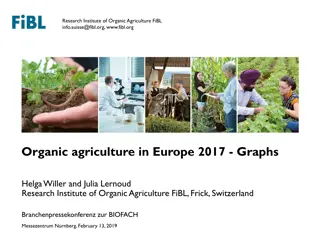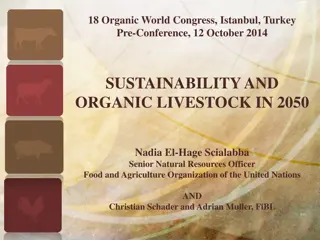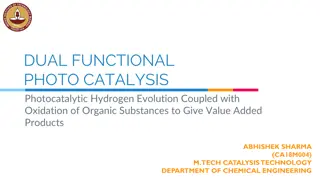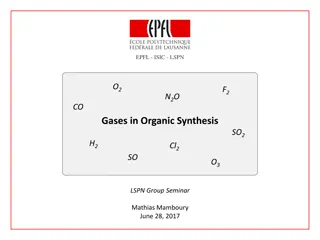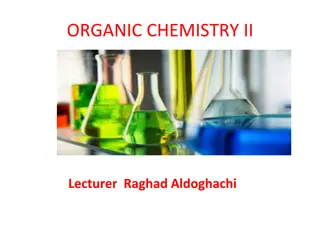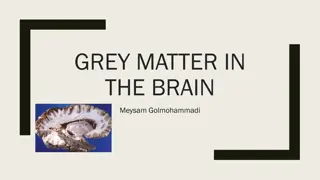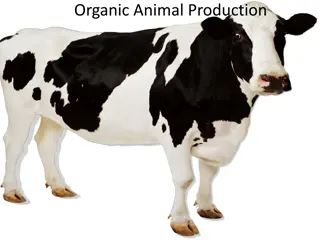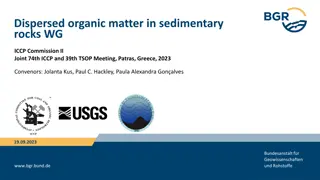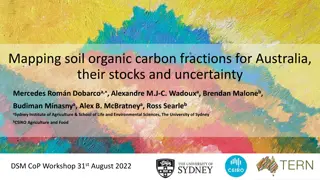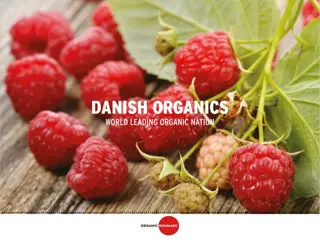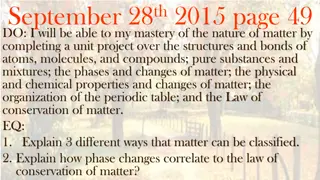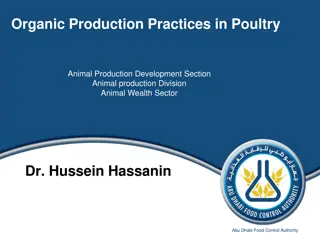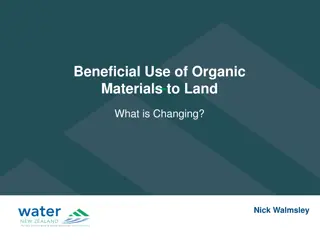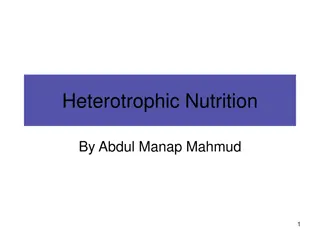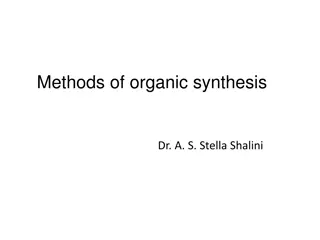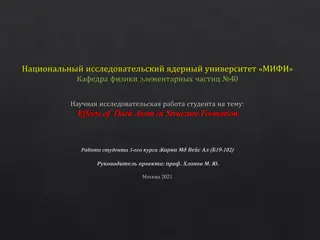CORE Organic Pleiades Network First Annual Workshop Roadmap 2030 - Event Recap
The CORE Organic Pleiades Network held its first annual workshop in Brussels, focusing on organic research and innovation in the European agri-food sector. The event discussed HEU partnerships, national/regional action plans, research funding, and more. CORE Organic aims to enhance knowledge and inn
0 views • 37 slides
Introduction to Chemistry: Matter, Energy, and Measurement
Chemistry is the study of matter, its properties, and the changes it undergoes. This content covers the basics of chemistry, including the classification of matter into pure substances and mixtures, different states of matter, and the building blocks of matter such as atoms and molecules. Sample exe
5 views • 51 slides
Understanding the Diels-Alder Reaction in Practical Organic Chemistry
The Diels-Alder reaction is a fundamental method in organic chemistry for producing cyclic organic compounds by combining a conjugated diene with an alkene. This reaction, named after Otto Diels and Kurt Alder, involves the formation of a six-membered ring with specific bond rearrangements. Conjugat
4 views • 15 slides
Understanding Composition of Soil Organic Matter in Soil Microbiology
Soil organic matter is vital for soil properties and plant nutrition. It consists of plant residues, animal remains, and microbial tissues, comprising complex compounds like carbohydrates, proteins, fats, and more. The composition varies with plant type, age, and nature. Leguminous plants are rich i
0 views • 19 slides
Organic vs Conventional Farming: An Overview
In the debate between organic and conventional farming, both methods have their pros and cons. While organic foods are perceived to follow stricter safety standards, both types meet FDA and USDA regulations. They offer similar nutritional value, but organic farming tends to have lower efficiency due
0 views • 6 slides
Separation and Purification of Organic Compounds: Methods and Techniques
The separation and purification of organic compounds are essential processes to obtain pure products, as impurities and side reactions can affect the quality of the compounds. Methods such as solution and filtration, crystallization, distillation, extraction, sublimation, and chromatography are comm
8 views • 15 slides
Enhancing Compost Quality for Organic Farming: Phosphorous-Enriched Compost Preparation
Composting is a natural process crucial for organic farming. Enriched compost improves nutrient supply to crops. Learn how to prepare phosphorous-enriched compost using organic wastes, bio-inoculants, and rock phosphate. Follow a method involving layering organic materials, cow dung, and rock phosph
3 views • 8 slides
Understanding Organic Certification and NPOP in India
Organic certification is crucial for ensuring the quality and authenticity of organic products. This involves adhering to strict production standards and undergoing periodic inspections. In India, the National Programme on Organic Production (NPOP) plays a significant role in certifying organic comm
0 views • 10 slides
Concerns and Recommendations on Non-Organic Agricultural Ingredients
Various Member States express concerns about the inclusion of new non-organic agricultural ingredients in Regulation 889/2008 Annex IX, emphasizing the need to maintain the integrity of organic production. Suggestions include keeping the list as short as possible, searching for organic alternatives,
0 views • 19 slides
Exploring Drivers and Constraints of Conversion to Organic Farming in Bhutan
Population in Bhutan heavily relies on agriculture, but the transition to organic farming has been slow despite the desire to reduce chemical use. This presentation investigates the current state of organic farming, identifies key factors affecting conversion, and offers policy recommendations to pr
0 views • 22 slides
organic chana masala
Nature\u2019s Spices Organic Chana Masala is a meticulously curated blend of organic spices, crafted to elevate the flavor of chickpea dishes. Sourced from certified organic farms, our masala blend is free from additives and artificial ingredients, e
1 views • 6 slides
Understanding Matter in Our Surroundings
Matter in Our Surroundings discusses the classification of matter, physical nature of matter, and the properties of matter particles such as size, space between them, and continuous movement. It explains how matter is made up of particles and how they interact with each other through various activit
0 views • 27 slides
Overview of Global Farmed Salmon and Organic Production
The data showcases the production figures for global farmed salmon across various countries, with Norway leading the production, followed by Chile, Scotland, and others. Additionally, insights into the growing organic salmon production, vulnerabilities in the sector, and details on organic mussels p
0 views • 9 slides
Understanding Organic Chemistry: Carbon Atoms and Molecular Diversity
In organic chemistry, carbon atoms can form diverse molecules by bonding to four other atoms, leading to molecular complexity and diversity. The versatile nature of carbon allows for the formation of various carbon skeletons, contributing to the vast array of organic compounds. Hydrocarbons, consist
0 views • 12 slides
Organic chicken masala
Organic Chicken Masala is a meticulously blended combination of premium organic spices, designed to elevate the taste and aroma of chicken dishes. Sourced from certified organic farms, our masala guarantees purity and is free from chemicals and pesti
1 views • 6 slides
Unveiling Dark Matter Mysteries Through Dark Photons
Delve into the exploration of dark matter through the lens of dark photons in the galactic center and detectors. Uncover the enigmatic nature of dark matter, its interactions, existing constraints, and our model with fermionic dark matter and a dark photon mediator. Discover strategies to evade cons
0 views • 18 slides
Guide to Organic Tobacco Production Process
Understand the process of organic tobacco production including obtaining a contract, certifying land, inspections, maintaining certification, selling leaf, and transitioning from conventional to organic production. Get insights on organic certification through USDA-National Organic Program, required
0 views • 18 slides
Exploring Dark Matter in Neutron Stars
Investigate the interaction of dark matter within neutron stars, comprising approximately 25% of the universe's total matter. The nature of dark matter assumptions, its distribution within neutron stars based on fermionic or bosonic properties, and the implications for self-interacting fermionic and
0 views • 22 slides
Understanding Bonds and Electrons in Organic Compounds
Explore the world of organic chemistry by delving into the concepts of bonds, electrons, and their roles in determining properties of organic compounds. Discover why saturated fats are considered unhealthy, learn about bond energies, lengths, and orders, and unravel the mysteries of organic compound
0 views • 13 slides
Overview of Organic Agriculture in Europe 2017
Europe has seen a significant increase in organic farmland and retail sales in 2017. With 2.9% of Europe's farmland being organic, totaling 14.6 million hectares, countries like Spain, Italy, and France lead in organic farming. In terms of retail sales, Denmark and Switzerland stand out with high pe
0 views • 9 slides
Insights into U.S. Organic Industry Trends and Outlook
The U.S. organic industry is experiencing positive consumer demand growth, with organic food sales reaching $56 billion in 2020. Despite a decline in organic dairy sales, the overall organic acreage growth remains strong. The market faces challenges such as the impact of COVID-19, the need for produ
0 views • 12 slides
Sustainability and Organic Livestock Modeling for Global Food Security
The research presented at the 18th Organic World Congress in Istanbul delves into the Sustainability and Organic Livestock (SOL-m) modeling approach developed by FAO and FiBL. The study aims to explore the potential impacts of global conversion to organic livestock production by 2050 on food securit
0 views • 25 slides
Promoting Participatory Guarantee Systems (PGS) for Small Scale Organic Farming in Thailand
The project aims to strengthen organic agriculture communities in Thailand through the establishment of Participatory Guarantee Systems (PGS) as an alternative to third-party certification. PGS advocates for market and government recognition, focusing on quality assurance, trust, and knowledge excha
0 views • 13 slides
Dual-Functional Photo Catalysis: Hydrogen Evolution & Organic Oxidation
The research explores dual-functional photo catalysis, combining hydrogen evolution with the oxidation of organic substances to produce value-added products. It focuses on utilizing photoelectricity to create electrons for hydrogen production and organic molecule oxidation. The study investigates th
0 views • 14 slides
Role of Gases in Organic Synthesis: A Comprehensive Overview
The presentation delves into the significance of gases in organic synthesis at standard temperature and pressure, focusing on reactions with atom incorporation for the synthesis of useful organic molecules. It covers various gases such as H2, O2, O3, CO, NO, N2O, SO2, Cl2, F2, discussing their advan
0 views • 23 slides
Organic Chemistry II Lecturer Raghad Aldoghachi - Laboratory Safety Rules and Distillation Techniques
Explore the world of organic chemistry with Lecturer Raghad Aldoghachi through laboratory safety rules emphasizing following instructions, chemical safety, and appropriate attire. Learn about hazard symbols, organic compound studies, distillation as a separation method, purification of liquid organi
0 views • 17 slides
Understanding Gray Matter in the Brain: Structure, Function, and Importance
Gray matter in the brain plays a crucial role in information processing and cognitive functions. Composed of neuronal cell bodies and unmyelinated axons, gray matter is visibly pinkish-gray and is essential for various brain functions. It forms a synaptically dense area with fewer cell bodies compar
0 views • 7 slides
Organic Animal Production in the US: Insights and Statistics
Organic animal production in the US involves raising livestock and poultry through natural practices without antibiotics or hormones. Animals are fed organic feed and have access to outdoor spaces to mimic natural behavior. Statistically, over 5 million acres of land are certified for organic animal
0 views • 19 slides
Dispersed Organic Matter in Sedimentary Rocks - Review Paper for Geological Application Studies in the 21st Century
The WG on Dispersed Organic Matter in Sedimentary Rocks is working on a review paper focusing on application studies of dispersed organic matter (DOM) within a geological context. The paper aims to provide an insightful overview titled "Applications of Dispersed Organic Matter Petrology in the 21st
0 views • 18 slides
Mapping Soil Organic Carbon Fractions in Australia: Stocks and Uncertainty
This study by Mercedes Román Dobarco et al. focuses on mapping soil organic carbon fractions across Australia, including mineral-associated organic carbon, particulate organic carbon, and pyrogenic organic carbon. The research involves prediction of soil organic carbon fractions using spectral libr
0 views • 17 slides
The Danish Model: Driving Organic Breakthrough & Market Growth
The Danish Model showcases the political and market mobilization behind the organic breakthrough in Denmark. Organic Denmark focuses on driving market growth through political policy, consumer motivation, innovation on farms, and strategic work with retailers and food services. The country has exper
0 views • 39 slides
Organic Conversion Plan Essentials: A Comprehensive Guide
Understanding the key components of an organic conversion plan is crucial for effective management of agricultural holdings. Explore the characteristics of the holding, enterprise details, and future management strategies outlined in the plan to ensure a smooth transition to organic production. Accu
0 views • 7 slides
Understanding Matter: States, Properties, and Changes
Matter is anything with mass and volume, existing in solid, liquid, or gas states. The Kinetic Molecular Theory explains the behavior of particles in matter. Chemistry explores matter through chemical and physical changes. Different factors, like temperature, can change the state of matter. Physical
0 views • 6 slides
Exploring the Nature of Matter: Unit Project Overview
Embark on a journey to understand the structures and bonds of matter through a comprehensive unit project. Delve into atoms, molecules, compounds, pure substances, mixtures, phases of matter, properties, periodic table, and conservation laws. Explore matter classification and phase changes' relation
0 views • 9 slides
Introduction to Chemistry and Matter
Understanding chemistry involves studying the properties of matter and its changes. Matter is anything that occupies space and has mass, composed of vibrating atoms. It includes examples like air, water, books, desks, and people, while non-examples are light, sound, thoughts, and emotions. Physical
0 views • 18 slides
Organic Poultry Production Practices Overview
Organic poultry production practices adhere to strict standards to ensure the birds are raised organically from an early age, without the use of hormones or antibiotics. Organic management requires access to the outdoors and prohibits withholding treatment from sick animals. Certification involves s
0 views • 21 slides
The Changing Landscape of Organic Materials Management
Explore the shift towards beneficial use of organic materials in land management as highlighted by the new guide developed to establish a consistent framework. The guide aims to address nutrient cycles, contaminants, and end-use by introducing quality criteria for environmental and public health pro
0 views • 16 slides
Understanding Heterotrophic Nutrition in Organisms
Heterotrophic nutrition refers to the process where organisms, such as animals, rely on preformed organic molecules from their environment or other organisms for nutrients and energy. These organisms are unable to produce organic compounds from inorganic sources and must obtain nourishment from exte
0 views • 55 slides
Evolution of Organic Synthesis in Chemistry
Explore the history and significance of organic synthesis through key figures like Dr. A. S. Stella Shalini, Hermann Emil Fischer, Sir Robert Robinson, and Robert Burns Woodward. Discover how complex organic molecules like D-glucose, tropinone, quinine, Vitamin B12, and strychnine were synthesized,
0 views • 18 slides
Exploring Dark Atom Effects on Structure Formation in the Universe
Overwhelming evidence points towards the existence of dark matter in the universe, with various theoretical models such as OHe atoms and Glashow's EIMP model proposed to explain its nature. Dark OHe atoms, consisting of 2 charged particles bound with primordial He nuclei, offer a unique perspective
1 views • 8 slides
